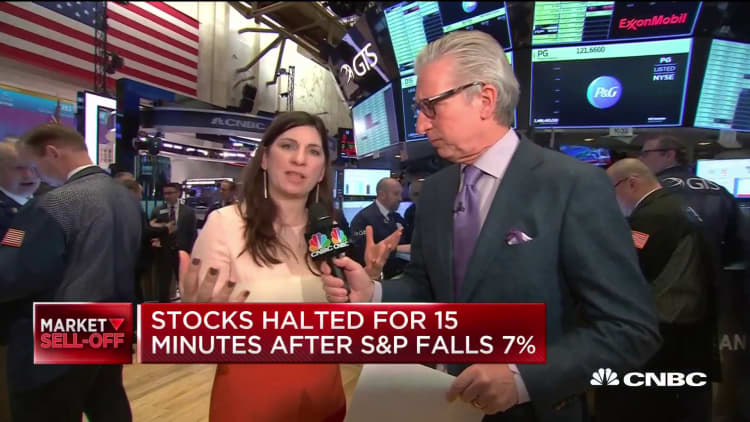The stock market opened on a rough note this week as fears that the coronavirus will continue to have widespread economic impact drove down stock prices. On Monday morning, the S&P 500 fell more than 7% at the open, triggering circuit breakers that led the New York Stock Exchange to halt all market trading for 15 minutes.
The plunge, which occurred just after the market opened, triggered what's called a 'circuit breaker' that immediately halted trading. Basically, this is a fail-safe that's built into the system to allow for a short cool down period.
"The market circuit breakers are designed to slow trading down for a few minutes, give investors the ability to understand what's happening in the market, consume the information and make decisions based on market conditions," New York Stock Exchange President Stacey Cunningham told CNBC's Bob Pisani. "This is operating as it's supposed to."
The current system of circuit breakers has never been tripped. A revamped system was put in place in February 2013 after the last set failed to prevent the May 2010 flash crash.
During regular trading hours, a circuit breaker can be triggered in a few situations:
- If the S&P 500 drops 7%, then trading will pause for 15 minutes.
- If the S&P 500 declines 13% on or before 3:25 p.m. ET, then trading will be paused again for 15 minutes. If the drop occurs after 3:25 p.m., then there's no halt.
- If the S&P 500 falls 20%, then trading will be suspended for the rest of the day.
Trading started back up at 9:49 a.m. ET and the S&P 500 continued to slide. Meanwhile, the Dow Jones Industrial Average, which tracks 30 stocks, fell 2,000 points, or 7.3%, at one point during morning trading. The Nasdaq, which features some of the market's biggest technology names as well as an assortment of other companies, fell 6.9% during the same period.
"The bull market's 11-year birthday is today, but investors are not in a celebratory mood," says Greg McBride, chartered financial analyst and chief financial analyst at Bankrate.com.
What it means for you
Over 66% of millennials have investments of some type. About a third of millennials invested in a taxable brokerage account in 2018, while another third invested in a retirement account, according to a study of over 1,800 millennials (ages 23 to 38) sponsored by the CFA Institute and the FINRA Investor Education Foundation.
If you're part of that group, the roller coaster markets do have an impact on your investments, including your 401(k). But before you panic, keep in mind that market downturns are fairly common. Market pullbacks with declines of less than 20% have occurred over 100 times since 1946, according to investment firm Guggenheim Funds.
"Investing should never be about a moment in time; it should always be about a process over time," Liz Ann Sonders, chief investment strategist at Charles Schwab, tells CNBC Make It.
That's a nice way of saying: Don't time the market. Most millennials (ages 24 to 39) have a long time horizon for their investments. Since there are likely decades before you retire, even if a recession hits tomorrow or next year, there's plenty of time for your investments to bounce back. Recessions and market downturns are part of a normal, healthy market cycle.

The best course of action right now is to keep investing and making regular contributions to your 401(k). This routine influx of money into your investment accounts is a strategy that experts call dollar-cost averaging. It's great for long-term investors because it takes emotion out of the equation and keeps you from selling out during market lows and buying in at market highs.
A 401(k) is actually a good place to invest amid market volatility, Sonders says. Typically, they're structured in a way so that you're buying on a regimented basis and many have the option to invest in target date funds, which have an automatic rebalancing process.
"As the uncertainty persists, the market frenzy will continue, perhaps for weeks, perhaps for months," McBride says. "But long-term investors must think in terms of years or decades."
Finally, just take a deep breath. Many millennials have strong "muscle memory" from their own involvement, or their parents' experiences, with the market during the last financial crisis, Sonders says. Yet the reality is that that market event was not the rule; it was more on the exceptional end of the spectrum.
"Markets fall sharply, but can also rebound quickly," McBride says. "No one knows when that comes and you don't want to be sitting on the sidelines when that happens."
Correction: A previous version of this article misstated the S&P 500 halted trading.
Check out: The best credit cards of 2020 could earn you over $1,000 in 5 years



